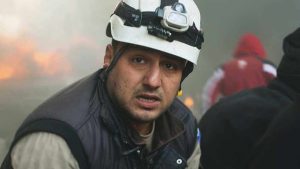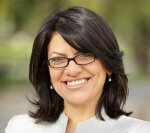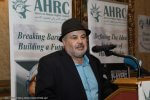Last Men in Aleppo series airs July 10 on PBS
‘Last Men in Aleppo,’ Airing July 10, 2017 on POV, Documents Syrian Volunteers’ Heroic Work
Incredible access, bravery and signs of life in a city under siege
Last Men in Aleppo. CREDIT: AMC 2017
The year is 2015. Syria’s brutal civil war has been ravaging the country since the government responded with force to civil protests during the Arab Spring in 2011. Regime, Kurdish, ISIS and rebel forces all occupy various parts of the city of Aleppo in northwestern Syria. A volunteer group called the White Helmets provides emergency services to traumatized residents in the rebel-occupied areas of the city. A crucial part of their efforts is rescuing survivors: After air attacks reduce buildings to rubble, the men of the White Helmets dig through the debris and pull survivors to safety. They are nothing short of heroes.
The White Helmets are the subject of Last Men in Aleppo, the searing documentary directed by Feras Fayyad that won the World Documentary Grand Jury Prize at the 2017 Sundance Film Festival. The film has its national broadcast premiere on July 10 at 10 p.m. (check local listings) on the PBS documentary series POV (Point of View). POV is American television’s longest-running independent documentary series, now in its 30th season. Last Men in Aleppo is the final film in this season’s special series highlighting the Syrian conflict and refugee crisis.

Captured with incredible intimacy and urgency, Last Men in Aleppo shows the White Helmets at work in the wake of bombing raids. The film provides exceptional access. Volunteers wear microphones for the filming, and viewers can hear them as they share information, give directions and pray. When they learn of a raid, they speed through chaotic streets full of rubble. They dig through piles of concrete and metal, sometimes using construction equipment, other times their bare hands.
The viewing is often visceral and difficult. Fayyad’s cameras are unflinching as they document the extraction of dead bodies, including those of children. Survivors are badly injured and covered in blood. There is grim talk of body parts, of how many survived and how many died. “I’m 100 percent sure we will find his head on the roof,” a White Helmet says of a victim at the site of a bombing.
In these painful moments, the men of the White Helmets reveal their resilience and bravery in the face of daily carnage. In addition to showing the men at work, Last Men in Aleppo follows a few of them as they go about their daily lives. One, Khaled, is the father of young children. In a heartbreaking scene, he takes his little girl to a pharmacist, who examines her hands and declares she is not getting adequate nutrition.
The documentary also follows Mahmoud, a young man who performs his work as a White Helmet with grave precision. With other White Helmets, Mahmoud and his brother Ahmed race to the scene of a missile attack on a car, now in flames. They begin trying to put out the fire so they can extract the bodies, but another air strike hits, and the men scatter.
In yet another searing moment, Mahmoud is troubled when he visits with young children he has rescued. “Was my head stuck in the rubble when you got me out?” a young boy asks Mahmoud. “I can’t do a visit like this again,” Mahmoud says later. “It’s so difficult.”
As the volunteers monitor the news and perform their arduous work, they contemplate the future. There is talk of escaping to Turkey, to Germany. Midway through the film, a friend asks Mahmoud about his dreams. “I dream that my brother will be safe,” Mahmoud says. “What are your dreams?” The friend replies, “To live a stable and secure life.”
“This film is a story about hope, and it is an attempt to study our humanity and shared responsibility when faced with mindless, irrational killing,” said Fayyad. “I saw this with the White Helmets, whose heroism did not discriminate between civilians and aggressors. Covering their efforts also allows us to show the world the devastating toll of the Syrian civil war. The White Helmets’ rescue efforts cannot be a permanent solution to this crisis. It is our hope that this film motivates people to stop this tragedy altogether, begin peace talks in Syria and help those civilians out of these disaster zones.”
“War brings out the worst in human beings, but it also brings out the best in us. The White Helmets are a living example of that. I hope this film will compel audiences abroad to follow that example.”
“Last Men in Aleppo soberly concludes this season’s special series on the Syrian war,” said POV executive director Justine Nagan. “At times agonizing to witness, the film leaves viewers awestruck at the bravery of volunteers like Mahmoud and Khaled and the resilience of civilians caught in the violence. With this film and the others in the series, we hope to have provided the American public a holistic view of the Syrian war and refugee crisis. In times of competing and sometimes conflicting narratives, this special series aimed to showcase the intimate viewpoints of filmmakers at every vantage point of these events.”
* * * *
About the Filmmakers:
Feras Fayyad, Director
Feras Fayyad is an award-winning filmmaker who has worked as a film editor and cinematographer on several documentary and narrative films. He has participated in international film festivals and received recognition for his work with contemporary Syrian issues and political transformation in the Arab world.
Steen Johannessen, Co-Director, Editor
Steen Johannessen is an experienced editor of a number of internationally acclaimed documentaries, including Motley’s Law, Miners Shot Down and Warriors from the North. Last Men in Aleppo marks his debut as a co-director.
Søren Steen Jespersen, Producer
Søren Steen Jespersen has produced several award-winning documentaries and directed Warriors from the North, winner of Best Mid-length Documentary at Hot Docs 2015.
Kareem Abeed, Producer
Kareem Abeed is a Syrian producer and one of the founders of the Aleppo Media Center. Abeed has worked as a producer for video features on Syria with several international outlets, including CNN, BBC and Channel 4.
Credits:
Director: Feras Fayyad; Co-Director, Editor: Steen Johannessen; Producers: Søren Steen Jespersen, Kareem Abeed; Cinematographers: Thaer Mohammed, Mojahed Abo Al Joud
About POV
Produced by American Documentary, Inc., POV is public television’s premier showcase for nonfiction films. Since 1988, POV has been the home for the world’s boldest contemporary filmmakers, celebrating intriguing personal stories that spark conversation and inspire action. Always an innovator, POV discovers fresh new voices and creates interactive experiences that shine a light on social issues and elevate the art of storytelling. With our documentary broadcasts, original online programming and dynamic community engagement campaigns, we are committed to supporting films that capture the imagination and present diverse perspectives.
POV Digital (www.pbs.org/pov/)
Since 1994, POV Digital has driven new storytelling initiatives and interactive production for POV. The department created PBS’s first program website and its first web-based documentary (POV’s Borders) and has won major awards, including a Webby Award (and six nominations) and an Online News Association Award. POV Digital continues to explore the future of independent nonfiction media through its digital productions and the POV Hackathon lab, where media makers and technologists collaborate to reinvent storytelling forms. @povdocs on Twitter.
American Documentary, Inc. (www.amdoc.org/)
American Documentary, Inc. (AmDoc) is a multimedia company dedicated to creating, identifying and presenting contemporary stories that express opinions and perspectives rarely featured in mainstream media outlets. AmDoc is a catalyst for public culture, developing collaborative strategic engagement activities around socially relevant content on television, online and in community settings. These activities are designed to trigger action, from dialogue and feedback to educational opportunities and community participation.
Major funding for POV is provided by PBS, The John D. and Catherine T. MacArthur Foundation, the John S. and James L. Knight Foundation, Corporation for Public Broadcasting and National Endowment for the Arts. Additional funding comes from Nancy Blachman and David desJardins, Bertha Foundation, Wyncote Foundation, The Fledgling Fund, Marguerite Casey Foundation, Ettinger Foundation, New York State Council on the Arts, Ann Tenenbaum and Thomas H. Lee, and public television viewers. POV is presented by a consortium of public television stations, including KQED San Francisco, WGBH Boston and THIRTEEN in association with WNET.ORG.


- Israelisnipers shooting and killing hospital workers in Gaza - December 11, 2023
- CAIR Condemns Israeli Executions of Wounded, Unarmed Palestinian in West Bank - December 11, 2023
- Arab and Muslim American voters face a “simple choice” between Biden’s inhumanity and Trump’s edgy politics - December 9, 2023
























